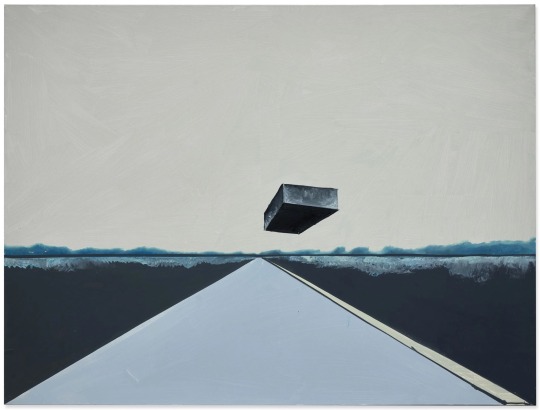#wilhelm sasnal
Explore tagged Tumblr posts
Text

Wilhelm Sasnal — Untitled (after “The Absinthe Drinker” by Pablo Picasso) [oil on canvas, 2023]
69 notes
·
View notes
Text
paintings round 3 poll 11


AG76 by Zdzisław Beksiński, 1976:
propaganda: I have always been mesmerized by Beksiński's particular brand of horror and this piece is a bit of a departure from his usual style, featuring a landscape and no recognizable bodily features, which I find so interesting. (Although it could be easily fit into the themes of war, destruction and what remains after present in his whole body of work) The whole atmosphere of the piece is so eery. The use of colour is also excellent! ! The red pops out amazingly.
submitted by @furbs-and-prayers
Shoah (Forest) by Wilhelm Sasnal, 2003:
propaganda: from the fb page Sztuka do kawy: “Gdy po raz pierwszy zobaczyłam ten obraz, nawet nie znając jego historii czy tytułu czułam, że z odmętem w tle jest „coś nie tak”. Zapierający dech w piersiach las nie jest ani przypadkowy, ani neutralny – scena rozgrywa się bowiem w okolicach Treblinki. Chaotyczna, głęboko zielona otchłań jest zatem miejscem pogromu, tytułowej Zagłady. Znana jest również tożsamość przedstawionych postaci. Mężczyzna w środku to Claude Lanzmann – reżyser 9-godzinnego filmu dokumentalnego o Zagładzie („Shoah”, 1985), nad którym pracował kilkanaście lat. Postać w białej spódnicy to tłumaczka, która przekłada rozmowę reżysera z idącym po jego prawej stronie mężczyzną. Ten ostatni zaś jest świadkiem zbrodni – właśnie opisuje Lanzmannowi swoje traumatyczne doświadczenia z czasów wojny.”
[When I first saw this painting, even not knowing its history or the title I felt there is something "wrong" about the turmoil in the background. The breathtaking forest is neither accidental nor neutral - the scene is set near Treblinka [one of the nazi extermination camps]. The chaotic, deep green abyss is the site of a genocide, the Shoah. We know the identity of the figures in the painting. The man in the middle is Claude Lanzmann, who directed a 9 hours long documentary about the Shoah ("Shoah", 1985), which took him over a decade. The figure in a white skirt is an interpreter who translates the director's conversation with the man on his right. The latter is an eyewitness of the massacre - he is describing to Lanzmann his traumatic experiences from the war period.]
77 notes
·
View notes
Text

Bathers at Asnières, 2010
Wilhelm Sasnal
32 notes
·
View notes
Text

56 notes
·
View notes
Text

Wilhelm Sasnal Untitled
Oil on linen. Painted in 2010.
#Wilhelm Sasnal#Wilhelm Sasnal Untitled 2010#polish artist#painter#painting#oil on linen#art#artist#art work#art world#art news
20 notes
·
View notes
Text

Forest by Wilhelm Sasnal
104 notes
·
View notes
Photo

Wilhelm Sasnal (Polish, 1972), Driving Sleeping, 2014. Oil on canvas, 120 x 159.7 cm.
635 notes
·
View notes
Photo

Wilhelm Sasnal (Polish,b.1972)
Untitled, 2010
Oil on canvas
155 notes
·
View notes
Text

45 notes
·
View notes
Text

Wilhelm Sasnal
#wilhelm sasnal#art#artwork#fine art#fineart#painting#art contemporary#contemporaryart#art contemporain#contemporary art#contemporary painting#contemporarypainting#new contemporary
17 notes
·
View notes
Photo

Wilhelm Sasnal — Glue Rundown (oil on canvas, 2020)
112 notes
·
View notes
Text
paintings round 2 poll 50


Anti-fascist demonstration by Stanisław Osostowicz, 1932-1933:
[no propaganda has been submitted]
Shoah (Forest) by Wilhelm Sasnal, 2003:
propaganda: from the fb page Sztuka do kawy: “Gdy po raz pierwszy zobaczyłam ten obraz, nawet nie znając jego historii czy tytułu czułam, że z odmętem w tle jest „coś nie tak”. Zapierający dech w piersiach las nie jest ani przypadkowy, ani neutralny – scena rozgrywa się bowiem w okolicach Treblinki. Chaotyczna, głęboko zielona otchłań jest zatem miejscem pogromu, tytułowej Zagłady. Znana jest również tożsamość przedstawionych postaci. Mężczyzna w środku to Claude Lanzmann – reżyser 9-godzinnego filmu dokumentalnego o Zagładzie („Shoah”, 1985), nad którym pracował kilkanaście lat. Postać w białej spódnicy to tłumaczka, która przekłada rozmowę reżysera z idącym po jego prawej stronie mężczyzną. Ten ostatni zaś jest świadkiem zbrodni – właśnie opisuje Lanzmannowi swoje traumatyczne doświadczenia z czasów wojny.”
[When I first saw this painting, even not knowing its history or the title I felt there is something "wrong" about the turmoil in the background. The breathtaking forest is neither accidental nor neutral - the scene is set near Treblinka [one of the nazi extermination camps]. The chaotic, deep green abyss is the site of a genocide, the Shoah. We know the identity of the figures in the painting. The man in the middle is Claude Lanzmann, who directed a 9 hours long documentary about the Shoah ("Shoah", 1985), which took him over a decade. The figure in a white skirt is an interpreter who translates the director's conversation with the man on his right. The latter is an eyewitness of the massacre - he is describing to Lanzmann his traumatic experiences from the war period.]
59 notes
·
View notes
Text

Wilhelm Sasnal - Bez Tytulu. 2005
8 notes
·
View notes
Text


Wilhelm Sasnal (b. 1972, Tarnów, Poland), Killing an Arab, 2016
20 notes
·
View notes

